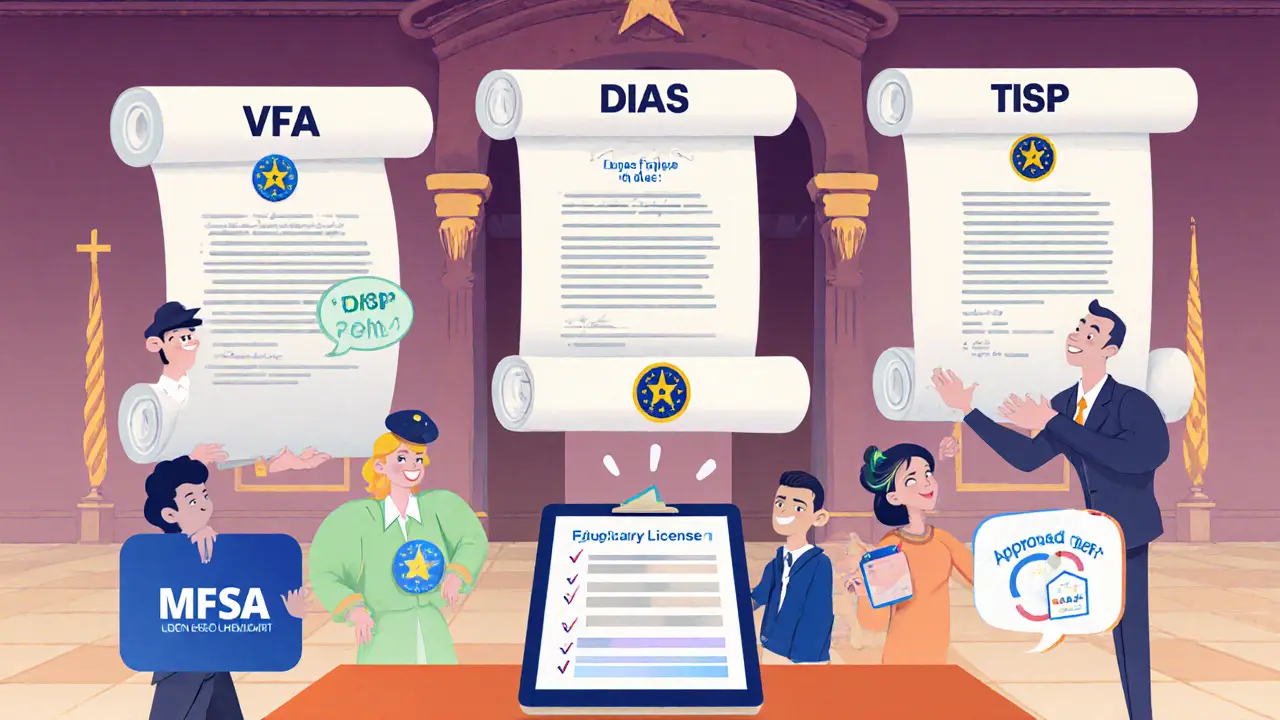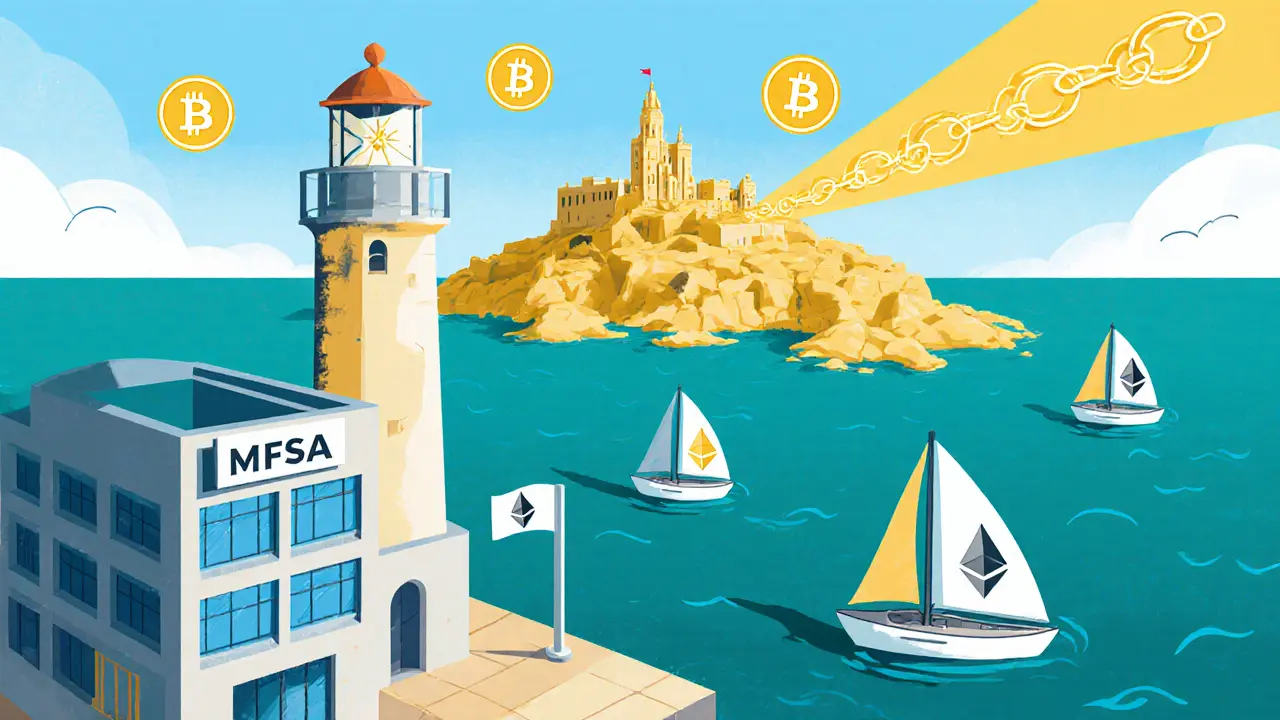Malta Crypto Business Setup Calculator
Estimated Tax Benefits
Malta's Corporate Tax Rate:
Effective Tax Rate (with Imputation Credits):
Capital Gains Tax:
Regulatory Compliance Time:
EU Market Access:
Malta is officially branded as the "Blockchain Island," a jurisdiction that blends progressive regulation, tax incentives, and strategic government support to attract crypto firms. If you’re weighing where to launch a cryptocurrency exchange, set up a token‑issuance platform, or simply protect crypto‑derived wealth, Malta’s playbook offers a concrete roadmap. Below you’ll see the core pieces of the island’s strategy, how they stack up against rivals, and exact steps you can take right now.
Key Takeaways
- Three blockchain bills passed in 2018 created the world’s first comprehensive crypto regulatory framework.
- No capital‑gains tax on long‑term crypto holdings; corporate tax can drop to 0‑5% via imputation credits.
- MFSA enforces clear rules aligned with the EU’s MiCA regulation, giving businesses predictable compliance paths.
- Residency programs (GRP, MPRP) let investors enjoy a 15% flat tax on foreign income and visa‑free travel.
- Compared with Estonia, Malta can reduce effective corporate tax to near‑zero and offers stronger EU market access.
1. The Legal Bedrock - Three Blockchain Bills
On July42018 Malta enacted the Virtual Financial Assets Act (VFA), the Malta Digital Innovation Authority Act, and the Innovative Technology Arrangements and Services Act. Together they define three license types - Virtual Financial Asset Service Provider (VFA‑SP), Digital Innovation Service Provider (DISP), and Technology Arrangement Service Provider (TASP). This three‑track system lets businesses pick the exact regulatory bucket that matches their activity, whether it’s a crypto exchange, a DeFi protocol, or a blockchain‑based gaming platform.
The MFSA Malta Financial Services Authority is the single supervisory body. In April2025 it issued a circular specifically for CASPs (Crypto Asset Service Providers) that are already licensed under the EU’s MiCA framework, clarifying reporting timelines and AML/KYC expectations. That move cemented Malta’s reputation as a jurisdiction that not only creates rules but updates them fast.
2. Tax Advantages That Matter
Malta’s tax model is the second pillar of its strategy.
- Capital‑gains tax: Zero for crypto held as a store of value or long‑term investment. The key is to prove the asset isn’t part of a trading business.
- Income tax on active trading: 15%‑35% progressive rates, applied like any other professional income.
- Corporate tax: Standard 35% rate, but the imputation credit system refunds up to 80% of tax paid, effectively lowering the net rate to 0‑5% for qualifying companies.
- Global Residence Programme (GRP): Offers a flat 15% tax on foreign income remitted to Malta, with a minimum €15,000 annual liability.
Establishing tax residency is simple - spend at least 183days on the island in a calendar year and you qualify for the zero‑tax capital gains regime.
3. Aligning with EU MiCA - Why It Helps Crypto Firms
MiCA (Markets in Crypto‑Assets Regulation) will become EU law across all member states in 2025. Malta’s early adoption means the MFSA already runs MiCA‑compliant licensing processes. The benefits are tangible:
- Access to the entire EU market without needing separate licenses in each country.
- Clear consumer‑protection rules that reduce the risk of regulatory shutdowns.
- Standardized AML/KYC procedures that satisfy both EU and Maltese supervisors.
For a crypto business, being MiCA‑ready in Malta cuts the time to market by months compared to setting up elsewhere and then retrofitting compliance.
4. Residency & Citizenship Pathways for Crypto Investors
Beyond taxes, Malta’s migration programmes turn crypto wealth into mobility.
- Malta Permanent Residence Programme (MPRP): Grants indefinite residence to investors who meet property‑ownership and financial‑means thresholds. Crypto‑derived funds are accepted if provenance is documented.
- Citizenship by merit: Under the Maltese Citizenship Act, individuals who make an “exceptional contribution” - such as large‑scale blockchain projects or significant job creation - can be naturalised after a fast‑track assessment.
Both routes give visa‑free access to over 180 countries, a compelling upside for globally mobile founders and investors.

5. Comparing Malta with Other Crypto‑Friendly Jurisdictions
| Aspect | Malta | Estonia |
|---|---|---|
| Regulatory framework | Three‑bill VFA system; MFSA supervision; MiCA aligned | Single licencing regime; higher capital requirements |
| Corporate tax rate | 35% nominal, effective 0‑5% via imputation credit | 20% flat |
| Capital‑gains tax on crypto | Zero for long‑term holdings | Taxed as normal income (20%) |
| EU market access | Full member state benefits, EU passport | EU member, but less regulatory clarity for crypto |
| Residency programmes | GRP (15% flat tax), MPRP, Citizenship by merit | e‑Residency (digital ID only, no tax benefits) |
For startups that need a tax‑efficient base and clear routes to EU customers, Malta’s combo of near‑zero corporate tax and robust licensing often outweighs Estonia’s simplicity.
6. Real‑World Adoption - Binance and OKEx Set Up in Malta
Both Binance and OKEx opened regional offices after the 2018 bills passed. Their moves were driven by three factors:
- Regulatory certainty - a single license covers exchange, wallet, and staking services.
- Tax efficiency - corporate refunds and zero capital‑gains tax on held tokens.
- Strategic location - a Mediterranean hub connecting European, African, and Middle‑East markets.
These flagship cases illustrate how the island’s policy translates into tangible business decisions.
7. How to Set Up a Crypto Business in Malta - Step‑by‑Step
- Choose the correct license type. If you run an exchange, apply for a VFA‑SP; if you develop a blockchain platform, consider a DISP or TASP.
- Prepare AML/KYC documentation. The MFSA requires a risk‑based AML policy, customer due‑diligence records, and a designated compliance officer.
- Use an accredited AML service provider to streamline the process.
- Submit the application. The MFSA portal accepts PDFs and supports “e‑submission” for faster review. Expect a 90‑day assessment window.
- Establish tax residency. Spend 183days in Malta, open a local bank account, and file a resident tax return to claim zero capital‑gains treatment.
- Leverage residency programmes. Enroll in GRP or MPRP to lower your personal tax burden and gain EU mobility.
- Align with MiCA. Follow MFSA’s MiCA guidance on token classification, white‑paper disclosures, and consumer safeguards.
Following these steps can shave months off the launch timeline and lock in the tax and regulatory benefits discussed earlier.
8. Potential Risks and How Malta Mitigates Them
Every jurisdiction has downsides. In Malta they include:
- Banking relationships. While the island offers crypto‑friendly banks, due diligence can be lengthy. Mitigation: partner with a local corporate services provider who already holds banking licences.
- Regulatory change fatigue. The MFSA may tweak VFA rules as EU law evolves. Mitigation: retain a compliance officer who monitors MFSA circulars and MiCA updates.
- Perception of “small market”. Some investors worry about limited local liquidity. Mitigation: use Malta as a base while accessing larger EU exchanges via passporting rights.
9. Future Outlook - What’s Next for Malta’s Blockchain Island?
Looking ahead to 2026 and beyond, the government plans:
- Introduce explicit tax breaks for crypto‑to‑crypto swaps, removing current gray‑area uncertainty.
- Expand public‑sector blockchain pilots (land registry, voting) - creating demand for local expertise.
- Boost funding for blockchain startups through a Maltese‑sourced venture fund targeting early‑stage DeFi projects.
If these initiatives roll out as expected, Malta’s edge over rivals like Gibraltar or the Cayman Islands will only widen.
Frequently Asked Questions
Do I need to be a Maltese citizen to benefit from the zero capital‑gains tax?
No. You only need to qualify as a tax resident by spending at least 183 days in Malta and proving that the crypto assets are held as a store of value. Citizenship is optional and mainly adds mobility benefits.
Can a DeFi protocol obtain a VFA‑SP licence?
Yes, if the protocol offers services that fall under the definition of a virtual financial asset service (e.g., token trading, staking, or custodial wallets). The application must detail the protocol’s smart‑contract audit reports and AML controls.
How does the imputation credit work to lower corporate tax?
When a Maltese company pays the 35% corporate tax, shareholders receive a credit equal to the tax paid. They can claim a refund of up to 80% of that credit, which reduces the effective tax burden to as low as 5% or even 0% for qualifying activities.
Is Malta’s licensing process faster than other EU states?
Generally, yes. The MFSA’s dedicated crypto unit processes VFA applications in around 90 days, whereas many EU regulators still operate under general financial‑services licensing which can take 6‑12 months.
What happens if MiCA changes after I’ve opened my Malta entity?
MiCA is a framework law; national regulators like the MFSA adapt their guidelines to stay compliant. Existing licences remain valid, but you’ll need to update policies (e.g., token‑classification reports) within the transition periods set by the MFSA.


Darius Needham
Malta’s strategic push for crypto really shows how a small island can punch above its weight, thanks to clear taxation rules and a proactive regulator who’s actually listening to the industry.